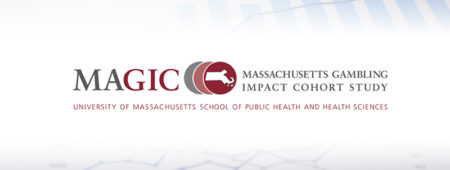From SEIGMA: UMass report examines transitions across four waves of Massachusetts Gambling Impact Cohort (MAGIC) study
- July 30, 2020
- by MGC Communications
- 0 comments

Valerie Evans, SEIGMA’s project manager, explains the importance of this new MAGIC report entitled “MA Gambling Impact Cohort (MAGIC): Transitions across Four Waves.” This report sheds light on changes in gambling behavior across four waves of the cohort with a focus on the stability and transitions of problem, at-risk, and recreational gamblers across four waves of the cohort study. A comprehensive report looking at all five waves of the cohort will be released at the end of 2020.
AMHERST – The Social and Economic Impacts of Gambling in Massachusetts (SEIGMA) research team has released a new report looking at four waves of the first major adult cohort study of gambling conducted in the United States. By surveying the same individuals over time, cohort studies provide information on how gambling and problem gambling develops, progresses, and remits. This has significant value as it can highlight risk and protective factors important in developing effective prevention, intervention, treatment, and recovery support services.
The Massachusetts Gambling Impact Cohort (MAGIC) study has three primary goals: (1) to understand the stability and course of problem, at-risk, and recreational gambling; (2) to develop an etiological model of problem gambling; (3) to use the findings from this research to optimize the treatment and prevention of problem gambling in Massachusetts. Previously released MAGIC reports, Wave 2 (Analysis of MAGIC Wave 2: Incidence and Transitions) and Wave 3 (The MA Gambling Impact Cohort: Analyses across Three Waves), focused on gambling participation, incidence of problem gambling, and transitions within the cohort with the addition of successive waves. This new report on the MAGIC study is primarily a descriptive account of the stability and transitions of problem, at-risk, and recreational gambling over four waves of the cohort study.
On July 30, 2020, Professor Robert Williams presented these findings to the MGC Commissioners during an MGC Open Meeting. He emphasized the relevance of this report to two specific research goals: (1) to monitor changes in prevalence of gambling and problem gambling over time to detect any impacts of casino introduction in Massachusetts and (2) to determine the stability and course of problem, at-risk, and recreational gambling.
One impact that the MAGIC study has been tracking is changes in gambling participation within the cohort across waves. For example, Wave 3 and Wave 4 saw a decrease in out-of-state casino visitation as compared to Wave 1 and Wave 2, perhaps attributable to the new, local casino gambling option for residents of the state. An increase in past year self-reported participation in traditional lottery, instant ticket, and raffles was observed in Wave 3, although a Powerball jackpot in 2016 may help explain some of the increase in sales of these specific products during this time. Wave 3 also saw an increase in daily lottery, bingo, and online gambling participation by cohort participants which could be explained by a change in the wording of questions about these types of gambling between the Wave 2 and Wave 3 surveys.
With regard to types of gamblers, an increase in recreational gamblers was observed in Wave 3 and Wave 4. Wave 4 saw an increase in problem gamblers plausibly related to the introduction of casinos in the state but the magnitude of the change was quite small. Individual stability of gambling categories was also investigated across waves. Non-gamblers and recreational gamblers were stable categories across waves while at-risk and problem gamblers were found to be less stable as they exhibited an increased frequency of transitioning between different gambler types across waves (e.g., at-risk gambler in Wave 2 to recreational gambler in Wave 3).
Read the full report here.
For additional information on the MAGIC and SEIGMA projects, including previous publications, please visit SEIGMA’s website: https://www.umass.edu/seigma/.